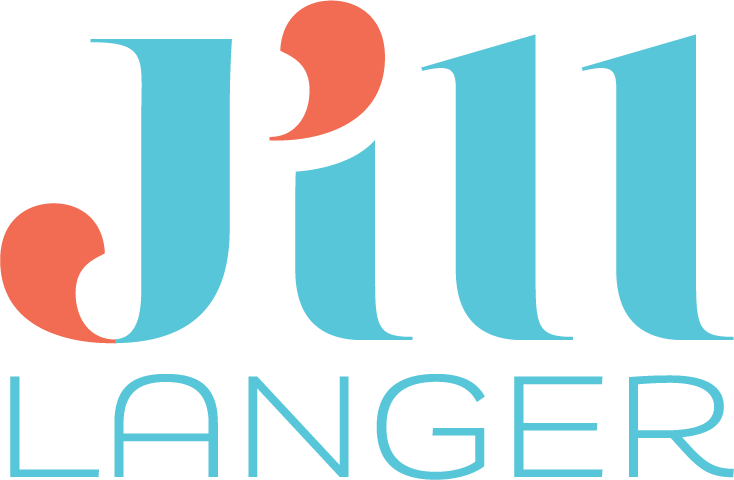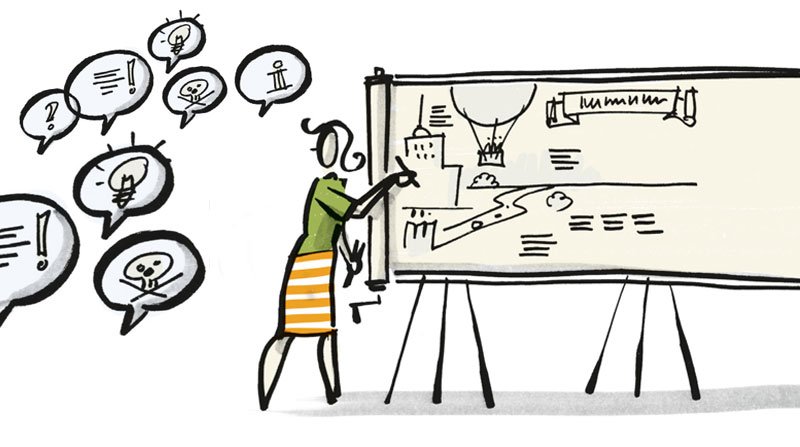Using Visualization at Work - Anyone Can Do It!
Courtesy of: Martin Haussmann, bikablo
There are many ways to integrate visualization into your everyday work. Most of the time it is about making content from your own specialist context visible in order to present knowledge, document dialogues or explore problems. I recently experienced a great practical example of visual presentation at one of our training courses in Switzerland.
A Story About Using Visuals at Work
At the end of a bikablo basic training, our participants develop their own presentation on their own topic. Lukas, a physician from Hinwil, Switzerland, used a poster to explain to us the origins of depression and how it can be treated. The group loved his simple illustrations, which came across as empathetic and yet somehow still joyful. We had never experienced such an informative presentation on such a difficult and often taboo subject. Lukas still continues to use visualization with patients who show indications of depression. He told me that visualization makes it easier for him to engage his patients in discussion so that he can help provide them with the best medical care and/or counseling.
Design: Visualization is not just "for creative people"!
As you can see, designers, artists, and illustrators aren't the only people who can effectively work with visualization - even if it does seem, at first, that people in those professions have a leg up on the rest of us: designers do often possess a good intuitive sense for translating abstract concepts into images. But, even they can learn from a bikablo training session – how to optimize their drawing technique, to draw faster, to develop a targeted repertoire of visual vocabulary, and to learn combination strategies for creating visuals.
In reality, people from many other professions also reap the enormous benefits of learning visualization, even when, at first glance, they don't appear to be “creative types.” Especially for people - as with our physician - who have to deal with difficult subject matter, visualization can be put to use in a meaningful way. Other experts, including anyone who needs to make detailed information and its inherent interrelationships accessible to others, can also benefit from learning and using visualization.
Content: Visual storytelling brings content to the point
Take the engineering profession as an example: engineers can use visualization in their work to help simplify complex concepts or to make clear the individual steps in a process. They help colleagues, co-workers, and service providers to comprehend the technical information that is essential to their interdisciplinary collaboration.
For the same reason, visualization can be an exciting tool for knowledge workers, educators, journalists, copywriters, and many other professionals. Like engineers, these people come more from the “content” side than the “design” side – for these experts, the focus of their work is on specialized topics. Visualization allows them to initiate an exchange with other collaborators or to learn techniques to help them in their studies or to pursue careers as educators.
Context: Visual facilitation facilitates process support with teams and organizations
The work done by moderators, facilitators, coaches, and consultants is generally “context-related.” It's frequently less about providing information than it is about providing support for learning, transformation, and team processes. The challenge they face is to facilitate discussions that center on sensitive topics. In these situations, images can function as catalysts for ideas that encourage dialogue, lend dignity to the participants, allow the unspoken to be brought into the conversation, reveal differing perspectives, and pin down agreements. This technique is referred to as Visual Facilitation – it is the highest order of visual thinking, learning, and collaboration. The best-known role in this area is that of the Graphic Recorder
How to become a visualizer
Could visualization, visual storytelling, or visual facilitation be beneficial in your career? Pick up a pen and find out. Join me for one of my upcoming bikablo visualization training courses .



